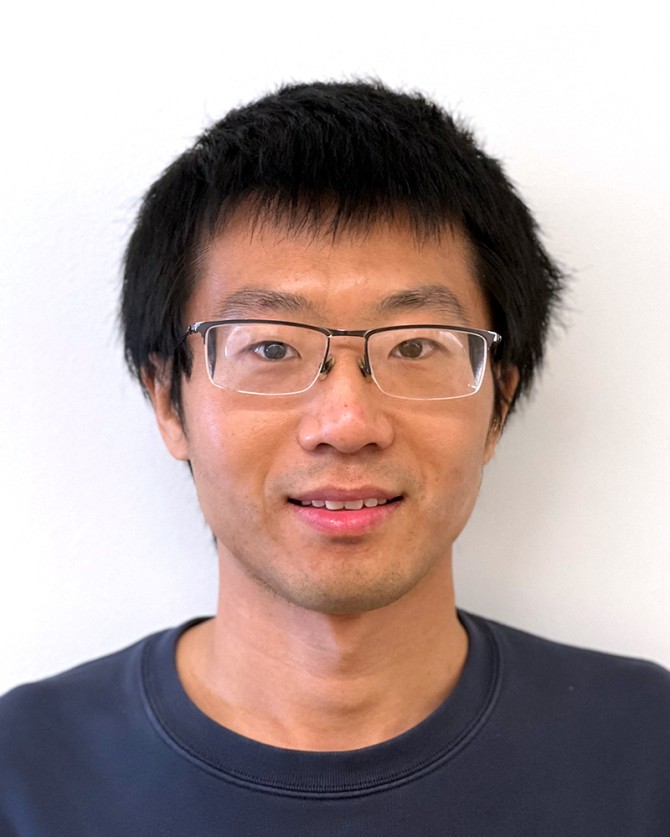News directly from Cornell's colleges and centers
Fleming Research Fellows to study antibacterial resistance, mechanisms for DNA repair
By Beth Goelzer Lyons
Yingzheng (Jason) Wang and Misha Kazi, postdoctoral researchers at Cornell’s Weill Institute for Cell and Molecular Biology, have been named as recipients of the 2022 Sam and Nancy Fleming Research Fellowships. Since 2008, these prestigious 3-year fellowships have supported talented young researchers who are doing cutting-edge research in basic biomedical sciences and planning careers in biological or medical research.
“The Fleming Fellowships provide exceptional young scientists the support, focus and freedom to pursue novel areas of study,” said Marcus Smolka, interim director of the Weill Institute for Cell and Molecular Biology and professor of molecular biology and genetics in the College of Agriculture and Life Sciences. “The 2022 recipients come highly recommended as brilliant, innovative, interdisciplinary researchers. Both are pursuing impressive studies to answer foundational questions in their fields.”
For Misha Kazi, the Fleming Fellowship will support her work in understanding how bacteria become resistant to an essential immune system defense, antimicrobial peptides (AMPs). All forms of life produce AMPs, nature’s version of antibiotic drugs. Like the drugs, they primarily attack bacteria, but AMPs can also kill yeast, fungi and viruses.
AMPs kill most bacteria by breaking their cell membrane. A class of bacteria called Gram-negative bacteria have two cell membranes and multiple ways to evade death by AMPs. Some are even heteroresistant, which means most will be killed by AMPs but a small number will continue growing. Getting an infection indicates that the bacteria have defeated the AMPs. How and why AMP resistance and heteroresistance happen is not well understood and neither are the effects AMPs and antibiotic drugs have on each other.
Kazi, a researcher in the lab of Tobias Dörr, assistant professor of microbiology in the Weill Institute for Cell and Molecular Biology in the College of Agriculture and Life Sciences, will study the interactions between Gram-negative bacteria and the AMPs found in Drosophila fruit flies, and how those interactions change when the bacteria become resistant or when antibiotic drugs are added. Although many of these bacteria typically live innocuously in humans and many other species, they are a growing cause of difficult-to-treat, antibacterial-resistant infections in seriously ill hospitalized patients.
“For a long time, I’ve been interested in how to kill bacteria. It is devastating how many antibacterial-resistant infections occur each year and how much it costs the health care community and individuals and their families. We have a whole range of naturally occurring antimicrobial peptides that we could potentially use as therapeutics,” Kazi said. “In order to do that we need to know more about how they function in their native environment during infection. This knowledge could lead to combination therapies, in which AMPs could help an antibiotic that has lost effectiveness overcome the bacterial resistance.”
For Yingzheng (Jason) Wang, the Fleming Fellowship will enable him to contribute to one of the most promising advances in cancer treatment, an advance tied to a powerful protein with a big name—ataxia telangiectasia and Rad3-related (ATR). ATR senses damage in DNA and coordinates DNA repair and protection. Normal cells depend on ATR to survive. Unfortunately, so do cancer cells, hijacking ATR to increase their ability to tolerate chemotherapies. Since chemotherapy attacks cancer cells by breaking their DNA, drugs that prevent ATR from repairing DNA are in clinical trial to see if they will be more effective in treating chemo-resistant tumors.
The ATR-inhibiting drugs currently in clinical trials have been developed based on the well-understood typical (canonical) pathways that signal ATR to repair damaged DNA. Wang, a researcher in Smolka’s lab, is studying the atypical (non-canonical) pathways to discover how and why those pathways become activated and how they affect the ability of cancer cells to become chemo-resistant, with a specific interest in the potential role of R-loops (a structure involved in gene expression and DNA replication). He will also investigate what opportunities those pathways may present to develop a new class of ATR inhibitors and the potential connections to spermatogenesis, a process that heavily relies on ATR and is vulnerable to chemotherapy.
“Using powerful mass spectrometry approaches, I will explore how the genome can activate non-canonical ATR pathways and how that relates to cancer and fertility,” explained Wang. “In my PhD work, I focused on how chemotherapy drugs affect female reproduction. I could not fully understand the effects of these drugs on the female organs, because some of the mechanisms for how chemotherapy works on cancer cells are not defined yet. My research will fill a major knowledge gap in understanding ATR activation and its regulation.”
The Weill Institute for Cell and Molecular Biology, established in 2008, is an interdisciplinary hub of cutting-edge research in biomedical engineering, chemistry and chemical biology, computational biology, microbiology, molecular biology and genetics, and plant biology.
Beth Goelzer Lyons is a freelance writer for the Office of the Vice President for Research and Innovation.
Media Contact
Get Cornell news delivered right to your inbox.
Subscribe

